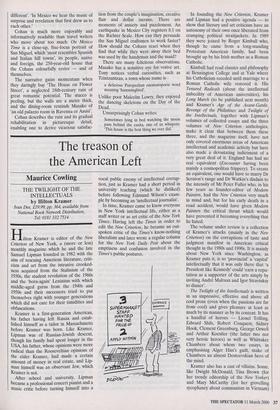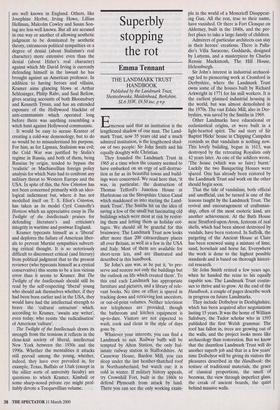The treason of the American Left
Maurice Cowling
THE TWILIGHT OF THE INTELLECTUALS by Hilton Kramer Ivan Dee, £19.99, pp. 364, available from National Book Network Distribution, Tel:• 0181 332 7514 Hilton Kramer is editor of the New Criterion of New York, a (more or less) monthly magazine which he and the late Samuel Lipman founded in 1982 with the aim of rescuing American literature, criti- cism and art from the intrusive crooked- ness acquired from the Stalinism of the 1930s, the student revolution of the 1960s and the 'born-again' Leninism with which middle-aged gurus from the 1940s and 1950s and their successors tried to put themselves right with younger generations which did not care for their timidities and obfuscations.
Kramer is a first-generation American, his father having left Russia and estab- lished himself as a tailor in Massachusetts before Kramer was born. Like Kramer, Lipman was of Russian-Jewish descent, though his family had spent longer in the USA, his father, whose opinions were more radical than the Rooseveltian opinions of the elder Kramer, had made a certain amount of money in real estate, and Lip- man himself was an observant Jew, which Kramer is not.
After school and university, Lipman became a professional concert pianist and a music critic before turning himself into a vocal public enemy of intellectual corrup- tion, just as Kramer had a short period in university teaching (which he disliked) before following Edmund Wilson's exam- ple by becoming an 'intellectual journalist'. In time, Kramer came to know everyone in New York intellectual life, either as a staff writer or as art critic of the New York Times. Having left the Times in order to edit the New Criterion, he became an out- spoken critic of the Times's know-nothing liberalism and later wrote a regular column for the New York Daily Post about the emptiness and confusion involved in the Times's public postures. In founding the New Criterion, Kramer and Lipman had a positive agenda — to show that literary and art criticism have an autonomy of their own once liberated from cramping political straitjackets. In 1989 they were joined by Roger Kimball who, though he came from a long-standing Protestant American family, had been brought up by his Irish mother as a Roman Catholic.
Kimball had read classics and philosophy at Bennington College and at Yale where his Catholicism receded until marriage to a Roman Catholic wife restored it. His Tenured Radicals (about the intellectual imbecility of American universities), his Long March (to be published next month) and Kramer's Age of the Avant-Garde, Revenge of the Philistines and Twilight of the Intellectuals, together with Lipman's volumes of collected essays and the three volumes of New Criterion anthologies, make it clear that between them these three, and the magazine itself, have not only covered enormous areas of American intellectual and academic activity but have also made a devastating indictment of a very great deal of it. England has had no real equivalent (Encounter having been mainly a cosmopolitan frippery). To create an equivalent, one would have to marry Dr Scruton's range and Dr Watkin's disdain to the intensity of Mr Peter Fuller who, in his few years as founder-editor of Modern Painters, had the New Criterion very much in mind and, but for his early death in a road accident, would have given Modern Painters the critical thrust which would have prevented it becoming everything that he hated.
The volume under review is a collection of Kramer's attacks (mainly in the New Criterion) on the corruptions of taste and judgment manifest in American critical thought in the 1980s and 1990s. It is mainly about New York since Washington, as Kramer puts it, is so 'provincial' a 'capital' intellectually that it was only there that 'a President like Kennedy' could 'earn a repu- tation as a supporter of the arts simply by inviting Andit Malraux and Igor Stravinksy to dinner'.
The Twilight of the Intellectuals is written in an impressive, effective and above all cool prose (even when the passions are far from cool) and gives pleasure at least as much by its manner as by its content. It has a handful of heroes — Lionel Trilling, Edward Shils, Robert Conquest, Sidney Hook, Clement Greenburg, George Orwell and Arthur Koestler (the latter two not very heroic heroes) as well as Whittaker Chambers about whom two essays, in emphasising Alger Hiss's guilt, make of Chambers an almost Dostoevskian hero of the mind.
Kramer also has a cast of villains. Some, like Dwight McDonald, Tina Brown (for her trendy editorship of the New Yorker) and Mary McCarthy (for her grovelling sycophancy about communism in Vietnam) are well known in England. Others, like Josephine Herbst, Irving Howe, Lillian Hellman, Malcolm Cowley and Susan Son- tag are less well known. But all are accused in one way or another of allowing aesthetic judgment to be dominated by aesthetic theory, extraneous political sympathies or a degree of denial (about Stalinism's real character) more extensive even than the denial (about Hitler's real character) against which Mr David Irving is currently defending himself in the lawsuit he has brought against an American professor. In addition to having heroes and villains, Kramer aims glancing blows at Arthur Schlesinger, Philip Rahv, and Saul Bellow, gives searing accounts of both Bloomsbury and Kenneth Tynan, and has an extended exposure of the Hollywood blacklist of anti-communists which operated long before there was anything resembling a witch hunt against Hollywood communists.
It would be easy to accuse Kramer of creating a cold-war demonology, but to do so would be to misunderstand his purpose. For him, as for Lipman, Stalinism was evil; the Cold War was justified by Stalin's regime in Russia, and both of them, being Russian by origin, tended to bypass the `realistic' or Machiavellian foreign policy analysis for which Nato had to confront any military threat to Western Europe and the USA. In spite of this, the New Criterion has not been concerned primarily with an ideo- logical indictment but, where it has not modelled itself on T. S. Eliot's Criterion, has taken as its model Cyril Connolly's Horizon which an appreciative essay in The Twilight of the Intellectuals praises for defending literature's and criticism's integrity in wartime and postwar England.
Kramer typecasts himself as a 'liberal' and deplores the failure of American liber- als to prevent Marxist sympathies subvert- ing critical thought. It is so notoriously difficult to disconnect critical (and literary) from political judgment that to the present reviewer (who typecasts himself as a cynical conservative) this seems to be a less vicious error than it seems to Kramer. But The Twilight of the Intellectuals should still be read by the self-respecting 'liberal' young who should ask themselves whether, if they had been born earlier and in the USA, they would have had the intellectual strength to brave the 'cultural ostracism' which, according to Kramer, 'awaits any writer', even today, who resists 'the radicalisation' of American 'culture'.
The Twilight of the Intellectuals draws its strength from the tensions it reflects in the close-knit society of liberal, intellectual New York between the 1930s and the 1990s. Whether the mentalities it attacks still prevail among the young, whether, indeed, they have ever prevailed in, for example, Texas, Buffalo or Utah (except in the sillier sorts of university faculty) are questions to which Kramer, Kimball or some sharp-nosed private eye might prof- itably devote a Tocquevillian volume.



































































 Previous page
Previous page